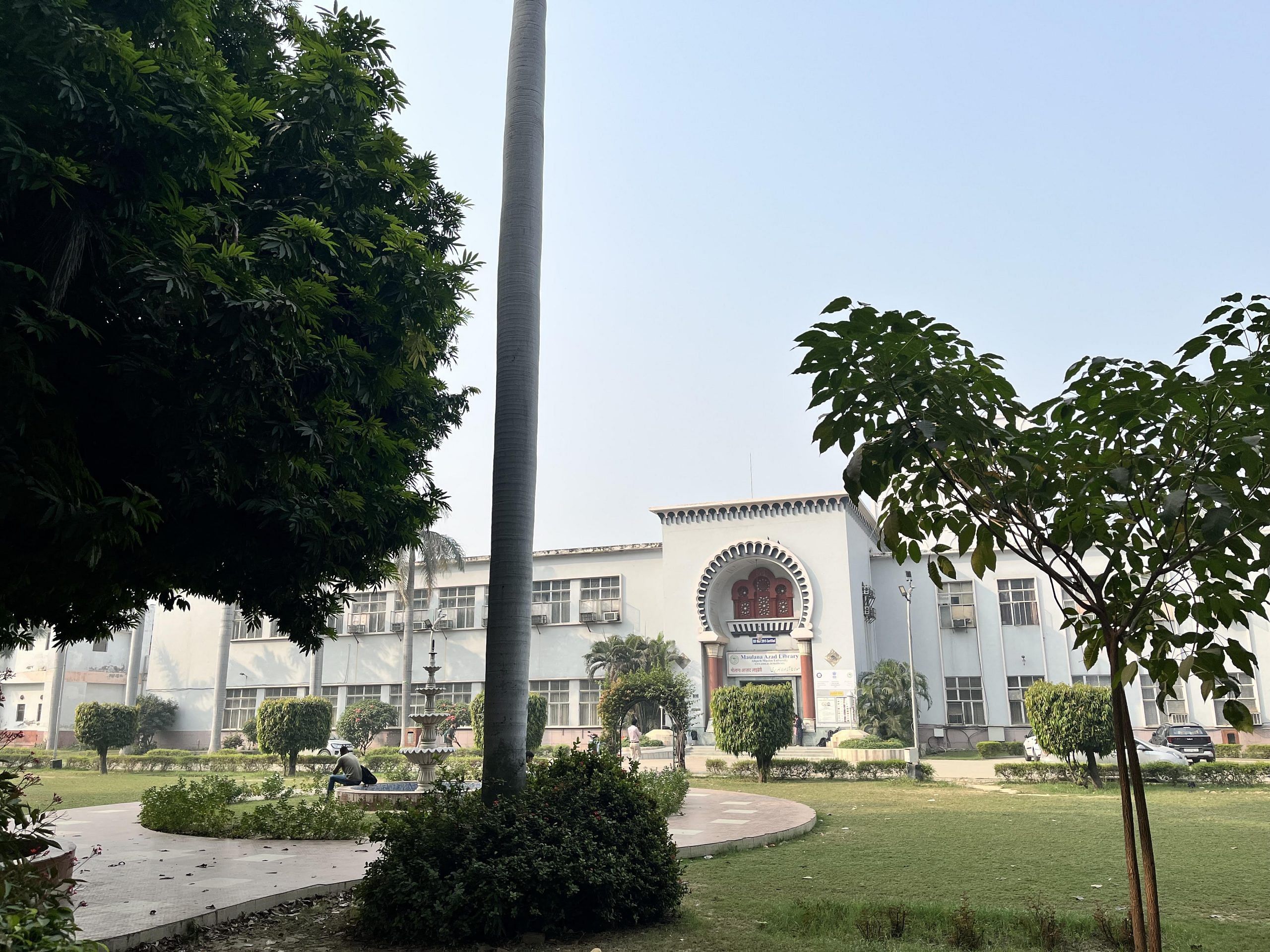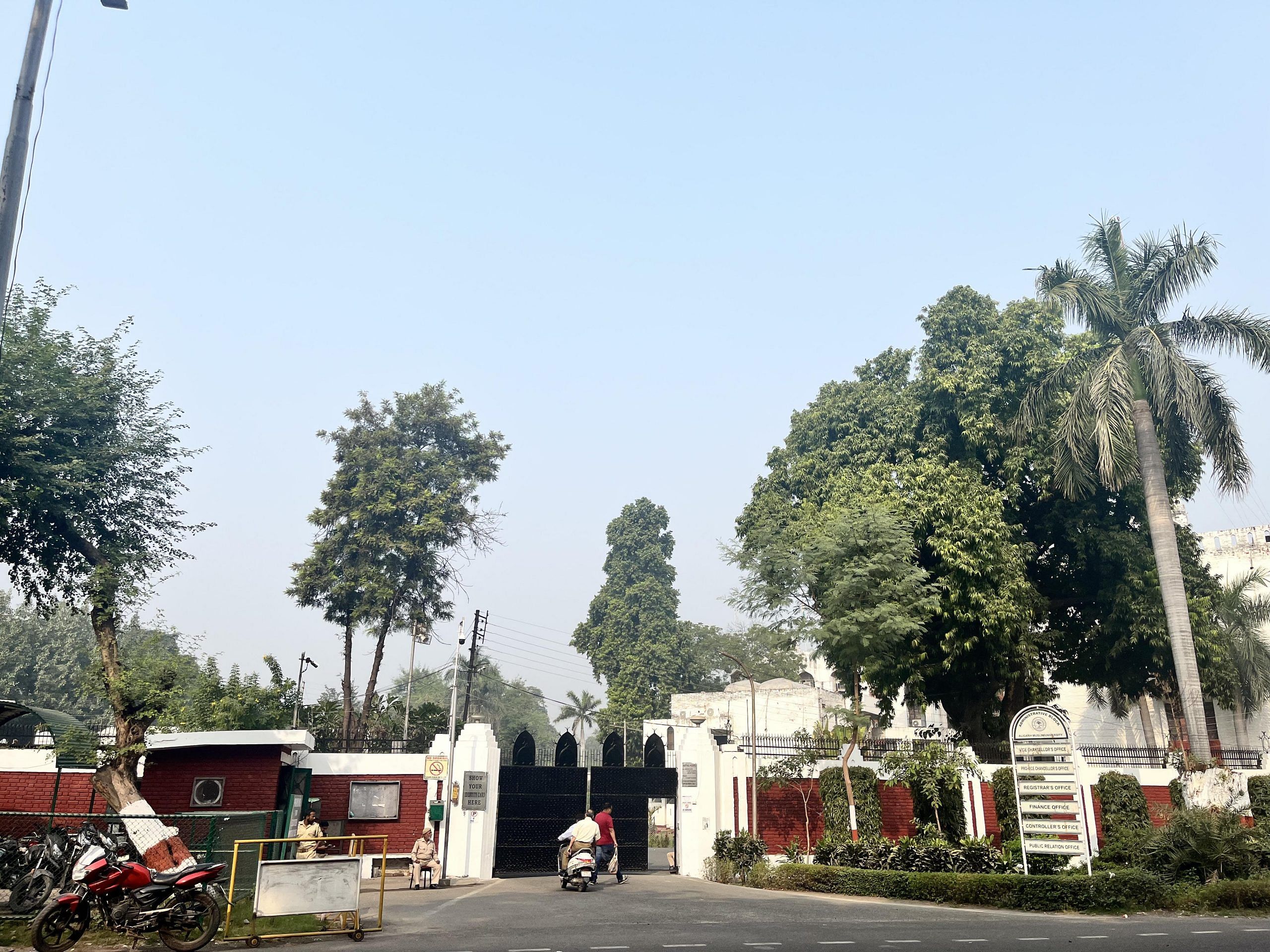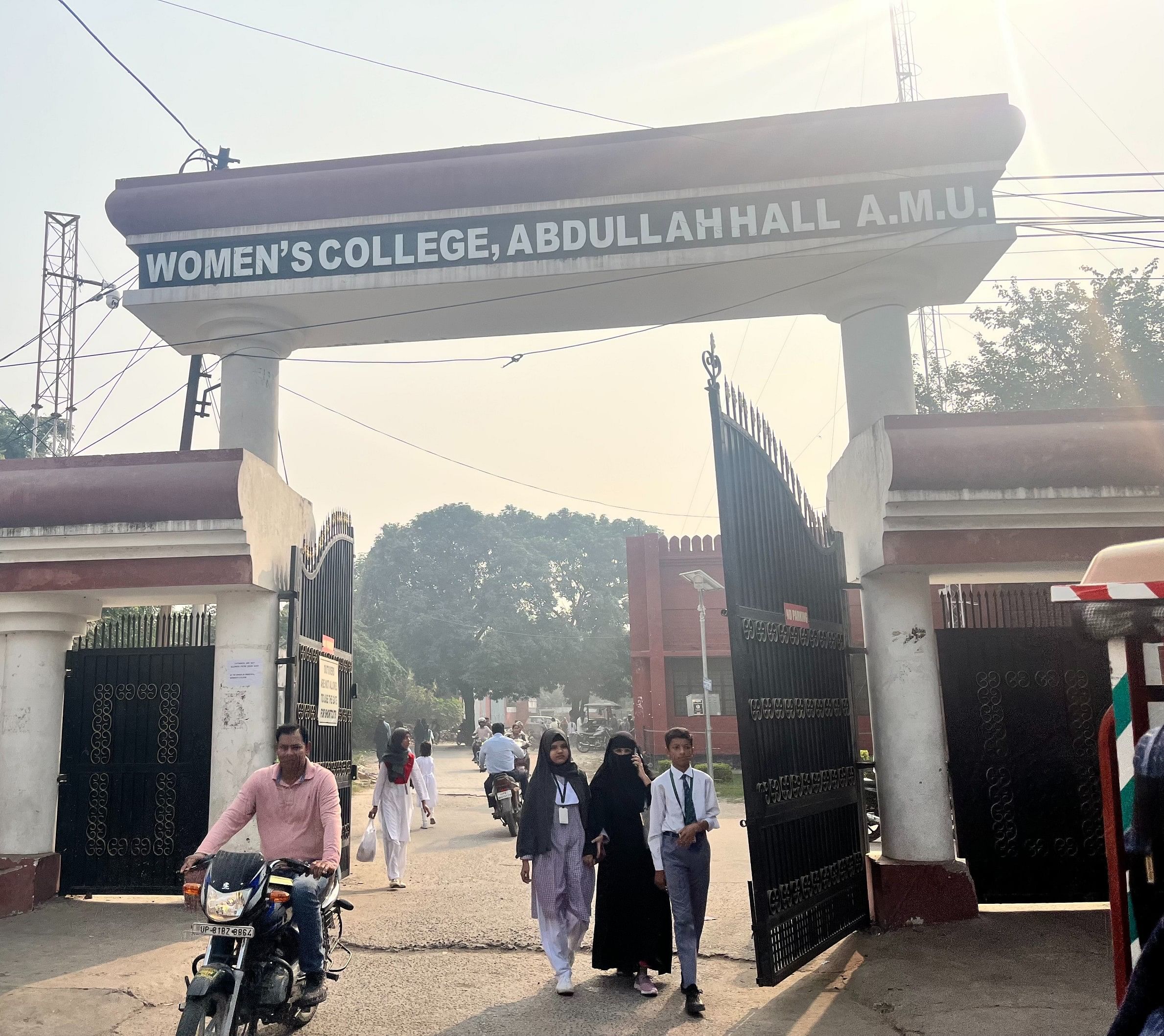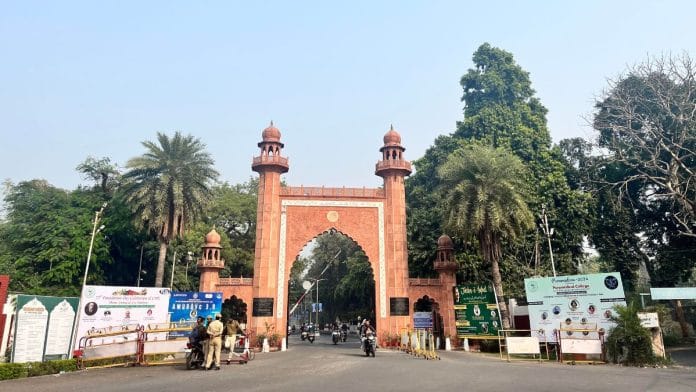Aligarh: A lively group of students, alumni, and faculty—both teaching and non-teaching—gathered at Bab-e-Syed, the main entrance of Aligarh Muslim University (AMU) at around 11.30 am Friday. The atmosphere was filled with excitement as they cheered loudly and firecrackers went off in celebration of the Supreme Court’s historic decision to overturn its 1967 ruling that had held that the university was not a minority institution.
Amid tight security, deployed in anticipation of potential protests if the top court had ruled differently, the crowd erupted in jubilant chants of “AMU Zindabad”. Mohammad Abdullah, a research scholar in security studies at the university, summed up the mood of the gathering: “It is a big relief! Revoking AMU’s minority status would be like tearing the soul from the body of a person.”
On Friday, the Supreme Court overruled the 1967 S. Azeez Basha vs Union of India case, which had ruled that since Aligarh Muslim University is a Central university, it could not be considered a minority institution under Article 30(1) of the Constitution of India. The verdict, delivered by a 4:3 majority, stated that the issue of AMU’s minority status should be decided afresh by a regular three-judge bench.
Students said that there is a common misconception that AMU has a ‘Muslim quota’.
“In reality, no such quota exists,” Hamza Khan, an undergraduate student, told ThePrint. “Many mistakenly associate AMU with just one community, but its history tells a very different story. When Sir Syed Ahmad Khan founded the university, it wasn’t only Muslims who supported it. Raja Mahendra Pratap donated much of the land, the first principal was an orthodox Christian, and the first graduate was Iswari Prasad Upadhyaya, a Hindu.”
For most at AMU, the minority status represents something deeply tied to the university’s “legacy”.
“By legacy, we mean the commitment to providing modern education to the Indian Muslim community. It’s about creating opportunities for marginalised Muslims to access higher education, offering them a chance to transform their lives through education,” Obaid Ahmad Siddique, Secretary of the AMU Teachers’ Association (AMUTA), told ThePrint.
According to the counsel’s submission in the Supreme Court, the university currently has 23,675 students, 18,700 (77.39 percent) of whom are Muslim. However, according to officials at the university, in major courses, including MBBS, the composition of non-Muslim students is almost 50 percent.
While the campus was abuzz with celebration over the restoration of the university’s “minority status”, both students and faculty stressed that the administration must focus on urgent matters plaguing the institution, now that this key issue has been addressed.
These include the persistent vacancies in teaching and non-teaching staff positions, the continued absence of a student union, and the diminished representation of both students and faculty in the university’s statutory bodies.
The case history
Established in 1875 as Mohammedan Anglo-Oriental (MAO) College in Aligarh by Muslim reformer Sir Syed Ahmad Khan, it metamorphosed into a university through the Aligarh Muslim University (AMU) Act, 1920.
Over the years, AMU has developed a distinctive ethos and philosophy, known as “Aligarh culture”. This unique culture not only shapes the identity of the university, but also defines the city itself, which is closely associated with the institution and its students.
However, the Act underwent various changes over time. It originally mandated religious teachings and said that the Court of the university, which is the governing body of the institution, must only consist of persons belonging to Islamic faith. However, the Act was amended in 1951 to remove this provision and others mandating religious education.
In 1965, the AMU Act was amended once again, reducing the University Court to an advisory body with members nominated by the Visitor (the President of India). Two years later, in 1967, the Supreme Court upheld these amendments in the S. Azeez Basha vs Union of India case, ruling that AMU was established by an Act of the central legislature.
The move triggered protest among students, following which under the Indira Gandhi-led government in 1981, the Lok Sabha passed the Aligarh Muslim University (Amendment) Act, granted the university minority status, and defined it as an educational institution established by Muslims of India.
In 2005, 24 years later, the university introduced a 50 percent Muslim quota in postgraduate medical seats, which was challenged in the Allahabad High Court. The court then struck the reservation down and the 1981 amendment as well.
In 2006, the university, in collaboration with the UPA (United Progressive Alliance) government, approached the apex court, which then ordered a status quo on AMU’s minority status. However, in 2016, the BJP-led central government withdrew its appeal and chose to oppose the university’s minority status.
In 2017, the Supreme Court referred the case to a seven-judge Constitution Bench, which delivered its judgment Friday, overruling the 1967 verdict. The matter will now be reconsidered based on the principles established in the current judgment.
“An institution to be a minority institution must satisfy the criteria of being administered as a minority institution on the date of the commencement of the constitution and being a minority institution on the date of formation,” the judgment said.
University Proctor Mohammad Wasif Ali expressed confidence that the three-judge bench of the top court would uphold AMU’s minority status. “The status quo has brought us relief for now, and based on the criteria set by the apex court, we are confident that the three-judge bench will also grant AMU its minority status. However, it is again a long legal fight we have to start afresh.”

Why ‘minority status’ matters for AMU
If AMU loses its minority status, it will, first of all, have to implement reservation in admissions and recruitment process. Currently, the Central Educational Institutions (Reservation in Teachers Cadre) Act, 2019, mandates reservation in all higher educational institutions, except institutions of national and strategic importance, and minority educational institutions.
Under the policy, 50 percent of the posts are reserved, including 27 percent for Other Backward Classes, 15 percent for Scheduled Castes and 7.5 percent for Scheduled Tribes. Besides, 10 percent over and above posts are reserved for economically weaker sections under the general category.
Currently, while there is no quota in faculty recruitment other than persons with disabilities, in admissions, there is a provision for up to 50 percent internal quota, irrespective of religion or caste.
Many students and faculty at AMU fear that the decision could lead to a decline in the number of Muslim students enrolling at the university.
“Had the Supreme Court revoked the minority status, the primary consequence would have been the implementation of reservation policies in admissions and recruitment, which could have severely affected the education of students from economically disadvantaged Muslim families—the largest demographic at the university,” said AMUTA’s Siddique.
He clarified that the faculty and students at the university are not opposed to reservations for OBCs, SCs or STs.
“What we want to emphasise is that the socio-economic and educational status of the Muslim community is significantly lower than that of OBCs and SC/STs. This has been highlighted by various committees,” he said. “Our concern is that there should be at least one or two institutions, where Muslims can access modern, scientific education—institutions that offer us an edge in fields like science and technology. This is the core issue we are advocating for. It’s not about opposing quotas for SC/ST communities, but about ensuring that Muslims also have opportunities to excel in modern education.”
Some faculty members have also raised concerns about how other practices at the university might be affected, if the minority status is revoked. “The university operates for half a day on Fridays to accommodate Friday prayers. There are mosques on campus—will they still be allowed to function? The university also offers theology as a subject—will that continue?” asked a senior faculty member, requesting anonymity.
AMU’s public relation officer Omar S. Peerzada said, “The legal team has to go through the details. We will soon examine it.”

Also Read: What is Cabinet-approved PM-Vidyalaxmi & how it will benefit 22 lakh meritorious students each yr
Issues even with minority status
With the Supreme Court granting status quo until the three-judge bench begins its proceedings, both faculty and students urged the administration to now focus on addressing pressing issues affecting the university’s day-to-day functioning. They noted that new Vice Chancellor Naima Khatoon has completed six months in office, yet little progress has been made so far.
According to the University Teachers’ Association, there are over 400 teaching vacancies on campus, and almost every administrative position—those of the registrar, finance officer, and several principals of colleges, including the medical college, are currently filled by ad-hoc staff, instead of permanent recruits.
“We demand that the recruitment process be initiated and the ad-hoc culture be brought to an end,” said Siddique.
“This has been going on for 10-15 years. We aren’t suggesting specific candidates, but the appointments should be made through a proper recruitment policy. Those in ad-hoc positions are not accountable or answerable, and this lack of responsibility undermines the university’s governance,” he said.
Teachers have also raised concerns that no elections have been held for faculty representation in the AMU Court, the university’s supreme governing body, for the past six years. “Why hasn’t the new V-C conducted elections for the teachers’ category in the University Court, especially when this issue has been ongoing for six to seven years, beginning with the previous administration and continuing under hers?” asked a faculty member on the condition of anonymity.
The university has been without a students’ union since 2019. Arif Tyagi, a student leader on campus, said, “The students’ union is a crucial part of the AMU Act. It is the sole channel through which the student body can communicate directly with the administration. Without a union, students have no formal platform to raise their concerns or be heard.”
The university’s students’ union has produced several prominent politicians in the past, including Azam Khan, Arif Mohammad Khan and Mohammad Adeeb, among others.
Students believe that since the violence during the 2019 protests against the Citizenship (Amendment) Act (CAA) and National Register of Citizens (NRC), when the police entered the campus and allegedly assaulted students, the university has shown resistance to conduct the student union elections.
“They believe it will create disruptions at the university, but they must not forget that they are denying students a right guaranteed by the University Act,” said Farhan Zuberi, a PhD scholar.
He said that despite repeatedly raising the issue with the new V-C, the administration has maintained that no action would be taken until the Supreme Court delivered its ruling on the minority status. “Now that the court has ruled in our favour, we will urge the administration to proceed with elections for the students’ union. The administration should not be apprehensive about it.”

With Khatoon serving as AMU’s first-ever woman V-C, female students are concerned that there have been no significant steps taken towards advancing “women’s empowerment” on campus since she took over.
“It has been over six months, yet we haven’t seen any new initiatives focused on promoting women’s empowerment,” said Nosheen Shan, a final-year undergraduate student.
“The women’s hostels still have a 5.30 pm curfew in winter and a 6.30 pm curfew in summer. Our classes finish by 4 pm, leaving us with very little time to engage in anything afterward. We’re unable to participate in extracurricular activities, while the boys’ hostels have no such restrictions…The women should not be treated as a minority in an institute, which exists to empower minorities.”
ThePrint tried to reach out to V-C Khatoon for a comment via calls and messages. This report will be updated, if and when a response is received.
A senior official in the administration, meanwhile, said that the university has issued an advertisement for recruitment of 150 faculty members. “Besides, discussions are underway regarding the students’ union elections.”
(Edited by Mannat Chugh)
Also Read: Exam panel govt set up after leak fiasco recommends multi-stage NEET-UG, all entrance tests online







How many instituitions caterbto religious minorities in Pakistan Bangladesh USA Canada Iran China?Will any studies happen that discuss that?
Shameful!
It’s these students and alumni who were responsible for conceiving the idea of Pakistan.
AMU is singularly responsible for the creation of Pakistan.
The Partition and it’s accompanying horrors will always be on the shoulders of this infamous institution.